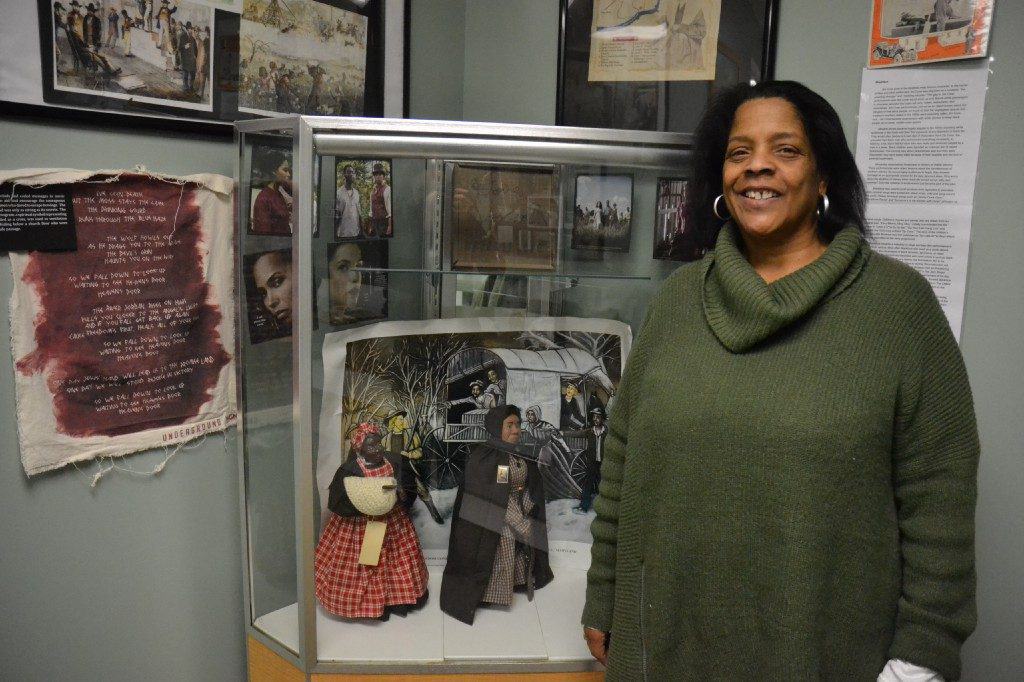
Joseph and Anita Jackson, hobbyists who compiled a massive archive of black contributions to American culture and beyond, school visitors on history excluded from established narratives

Anita Jackson’s interests are varied — she loves cars, trains, crafting and sewing, and hunting for everything from Snoopy keepsakes to items featuring her favorite pattern, houndstooth. But her largest and most important collection, which she and husband Joseph accumulated over many years, tells the story of black history in the United States.
The Jacksons opened the South Jersey Black Heritage Museum, directed by Joseph, in June after nearly three decades of amassing documents, photos, art, toys, memorabilia — you name it, they probably have it — that together display the progress of civil rights and the black community’s contributions to almost every area of American society. After years of keeping the collection in their basement and traveling with it to different locations, it was time to give it a home the public could visit.
Visitors are greeted by an iron-and-cement lawn jockey, its skin painted brown by Anita, that generations ago would have served a distinct purpose on properties in the U.S.
“Back during slavery and different times in history, when you see a jockey with a lantern in his hand that’s lit, that meant it was a safe house and people could come there for food, clothing and a place to hide,” Anita explained.
Joseph, who worked as a corrections officer in New Jersey, was inspired to document the achievements of black trailblazers in his field when he noticed a lack of recognition for African Americans in law enforcement. His inspiration led him correspond with local police departments and eventually with Supreme Court Justice Thurgood Marshall, whose letter he keeps in a glass display case in the museum’s Civil Rights Room.
The outcome of his research manifested in documents, uniforms, photographs and heirlooms from various police departments and branches of the armed forces that now fill the void he once observed, spanning multiple rooms in the museum to highlight the accomplishments excluded from the historical narrative.
The schooling continues at every corner of the museum, which includes lessons in the process of crafting porcelain dolls and dollhouses. A lifelong enthusiast, Anita set up a cabinet that holds dozens of her handmade babies and larger creations, all lovingly propped up to be admired by guests.

Anita, who worked as an infant care nurse and later opened a daycare in her home to spend more time with her own daughters, began making the diverse array of baby dolls about 20 years ago. Her love of children is a constant in the museum, which for her is all about educating younger generations and empowering girls.
“I have a board in the Barbie room that little girls can write on, ‘I can be whatever I want to be,” and put down whatever they want,” she said. “One wants to be a teacher, another a guitar player, a social worker, a veterinarian, a dancer. If kids from the shelters want to come, they’re welcome here for free whenever they want.”
In addition to owning every holiday Barbie issued over the past 20 years, Anita’s collection boasts nearly every black Barbie issued since the first one was put on the market in 1980. Across the hall in the Civil Rights Room, the injustices of Jim Crow, minstrel and mammy caricatures and anti-black groups are embodied by vintage dolls, figurines and other artifacts — a prelude to the items that pay homage to civil rights heroes and their efforts to overcome those forces.

Despite the overwhelming volume of the Jacksons’ collection, Anita is hardly done adding to the inventory. Right now, she’s on the lookout for an Aunt Jemima cookie jar and a very special doll, whose picture she keeps on her phone.
“It talks, and it says, “I love my hair, I love my skin, I can be anything I want,’”Ainta said. “I need that doll!”
The South Jersey Black Heritage Museum, located at 2010 New Albany Road in Cinnaminson, is open Wednesday-Saturday and Tuesday by appointment. Admission is $7 for adults, $5 for seniors and children ages 4 and up and free for 3 and under. Saturdays are pay as you wish.
Visit www.sjbhm.org for hours of operation, planning your visit and to see what events the Jacksons have planned for February.









